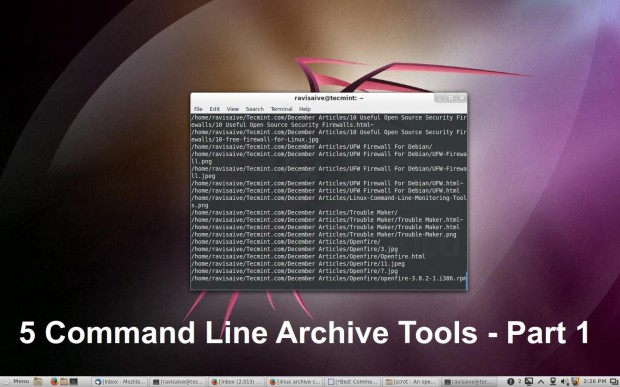In our day-to-day life we come across, archived files on the platforms of all kind be it Windows, Mac or Linux. There are several Application program available for all of the platforms to create archive files as well as uncompress them. When it comes to work on Linux Platform, we need to deal with archived files very frequently.
Here in this article we will be discussing archive tools available on standard Linux Distribution, their features, Examples, etc. The article divided into two parts, each part contains five command line archive tools (i.e. total of 10 Best Command Line Archive Tools).
What is Archived file?
An archive file is a compressed file which is composed of one or more than one computer files along with metadata.
Features of Archiving
- Data Compression
- Encryption
- File Concatenation
- Automatic Extraction
- Automatic Installation
- Source Volume and Media Information
- File Spanning
- Checksum
- Directory Structure Information
- Other Metadata (Data About Data)
- Error discovery
Area of Application
- Store Computer Files System along with Metadata.
- Useful in transferring file locally.
- Useful in transferring file over web.
- Software Packaging Application.
The useful archiving application on standard Linux distribution follows:
1. tar Command
tar is the standard UNIX/Linux archiving application tool. In its early stage it used to be a Tape Archiving Program which gradually is developed into General Purpose archiving package which is capable of handling archive files of every kind. tar accepts a lot of archiving filter with options.
tar options
- -A : Append tar files to existing archives.
- -c : Create a new archive file.
- -d : Compare archive with Specified filesystem.
- -j : bzip the archive
- -r : append files to existing archives.
- -t : list contents of existing archives.
- -u : Update archive
- -x : Extract file from existing archive.
- -z : gzip the archive
- –delete : Delete files from existing archive.
tar Examples
Create a tar archive file.
Decompress an tar archive file.
For more detailed examples, read 18 Tar Command Examples in Linux.
shar Command
shar which stands for Shell archive is a shell script, the execution of which will create the files. shar is a self-extracting archive file which is a legacy utility and needs Unix Bourne Shell to extract the files. shar has an advantage of being plain text however it is potentially dangerous, since it outputs an executable.

No comments:
Post a Comment